
Edward Brierley joined up aged 18 years. His number was M.M. 20041.
Born in Ballsbridge, Ned, though employed, volunteered aged 18. His Battalion were called, the Shining Eight. They were part of the 48th Brigade attached to the 16th (Irish) Division, with which Jesuit, Fr. Willie Doyle, was serving when killed in August 1917.

Ned’s Service Medals: the leftmost is the Military medal; the second from the left is the 1914-15 Star; the second from the right is the George medal; the medal on the right is the Victory medal. Two of the medals were nicknamed Pipsqueak & Winnie after two popular cartoon characters of the time.
Private Brierley won three awards for bravery while serving with the 16th (Irish) Division. The first, at the battle of Ginchy, the second award at Passchendaele (3rd Battle of Ypres).
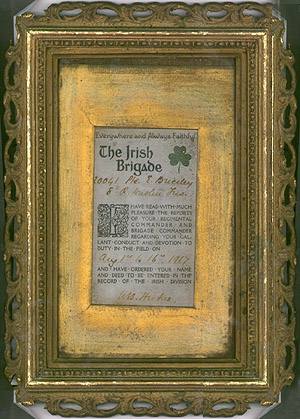
One of Ned’s Certificates of Bravery. Ned was awarded three in total. The motto at the top of this document is ‘Everywhere and Always Faithful’. It was signed by Major Hickie.
Transferred to the Royal Engineers near the end of 1918 and addressed as Sapper Brierley, he won his third award during the final Allied assault on the Germans.

Edward Brierley – Diary
Edward’s diary, dated Thursday, March 21st, states, ‘Offensive started, hold Brown Line until 11:00 pm from 5:30am.’
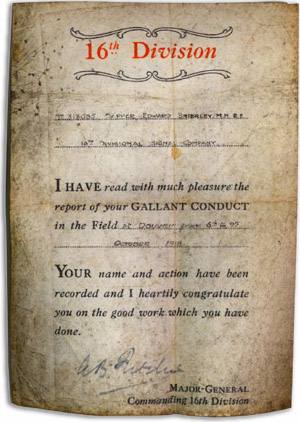
This Certificate of Bravery is Ned’s third. He had been transferred to the Engineers of the 16th (Irish) Division. Ned was known as Sapper Brierley.
During this massive and final German assault, 1,062 Dublin Fusiliers were killed, wounded by gas and shells, or captured.
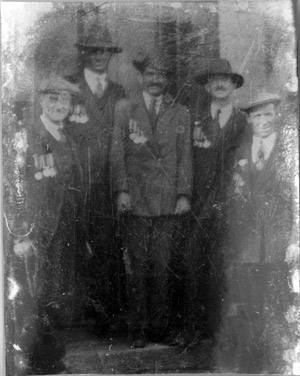
Ned is the second man from the left. All these veterans are wearing their medals.
Ned Brierley survived and returned home, resuming his job with the Pembroke District Council. He played football with Shelbourne A.F.C. during 1925/26 and with St. Mary’s United A.F.C. of the Leinster Football League.
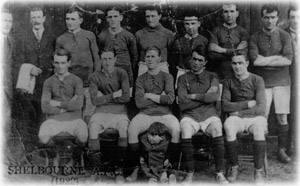
Ned was a keen footballer and played for both Shelbourne and St. Mary’s. His memorabilia also includes several football medals.
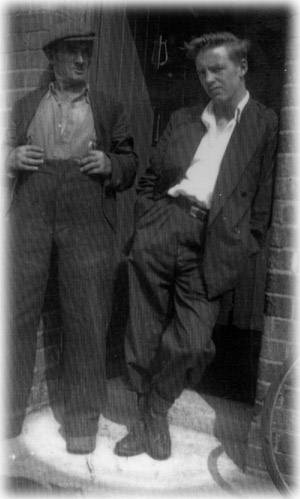
Ned in later life with one of his sons, at their front door.
That season, Edward won a runners-up medal playing for St. Mary’s in the Edmund Johnson Cup and the following season, a runners-up medal in the Metropolitan Cup.
On September 17th, 1924, Edward married Mary Hayden at St. Joseph’s, Glasthule, Co. Dublin.
They had seven children, one of whom, Noel, said, “My father was a very quiet, hard working man who never spoke about his experiences in the war.”
Edward died from a heart attack while working, on November the 23rd 1955.
Here are some personal items Edward acquired over his lifetime…
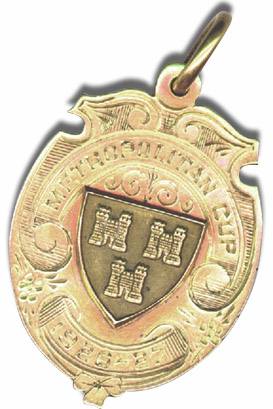 Edward won this medal in the 1926-27 football season playing with St. Mary’s United A.F.C. |
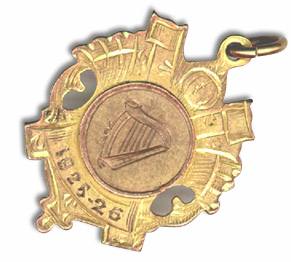 Ned won this medal as a runner-up with St. Mary’s United A.F.C. in the Edmund Johnson Cup. He also played with Shelbourne A.F.C. that season. |
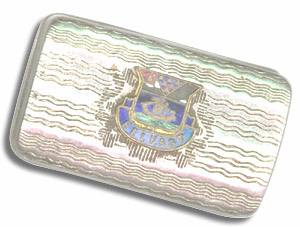 This snuff box belonged to Ned and bears the emblem of the City of Belfast. |
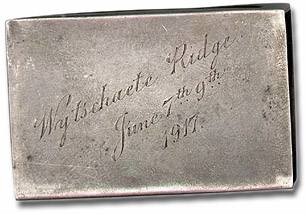 A matchbox commemorating the Battle at Wytschaete Ridge. He received another for the Battle of Ginchy. |